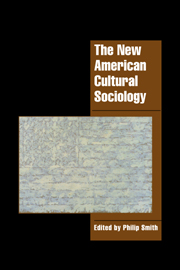PART I - Culture as text and code
Published online by Cambridge University Press: 18 January 2010
Summary
At its core the study of culture is the study of meanings. It is a process involving the distillation of essences of significance from the base material of social life. There is a broad consensus among American cultural sociologists that this alchemical task can be best accomplished using the apparatus criticus of structuralist and poststructuralist concepts. Signs, symbols, narratives, discourses, myths, and so forth are the alembics through which the process of refinement takes place. Yet, if there is agreement on basic tools and concepts, there is discord on broader questions of approach. Differences center around two sets of issues. The first of these is the relationship between cultural inquiry and “mainstream” sociology. What is at stake here is whether cultural analysis should be understood as a radical enterprise which fundamentally transforms the nature of sociology, or whether it can best be accommodated within existing conceptual and methodological frameworks. The second, and related, issue is the question of the autonomy of culture and its links with social structure. Some sociologists, especially those strongly influenced by postmodernisms, consider that these kinds of traditional distinctions are no longer relevant or helpful. To the contrary they assert that culture and social structure are so deeply implicated that it is both futile and misguided to attempt to define where their boundaries might lie. In the introduction to this book I argued that most American cultural sociologists can be understood as holding to a conservative, disciplinary view of their enterprise – a position which tends to sustain the concept of culture as a separate “variable.”
- Type
- Chapter
- Information
- The New American Cultural Sociology , pp. 15 - 18Publisher: Cambridge University PressPrint publication year: 1998

